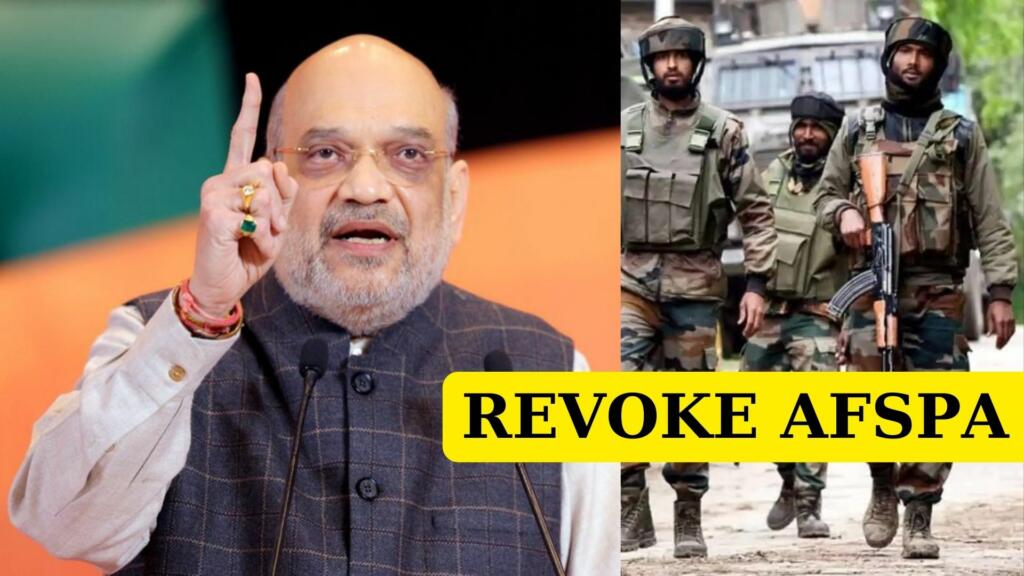In a significant move, Union Home Minister Amit Shah has indicated the possibility of revoking the controversial AFSPA in Jammu and Kashmir. This announcement comes as part of broader plans to recalibrate security measures in the region, emphasizing a shift towards empowering the Jammu and Kashmir Police and reducing the presence of central armed forces. The potential revocation of AFSPA marks a pivotal moment in the region’s security landscape and invites a reevaluation of the government’s approach to maintaining law and order.
What is AFSPA?
AFSPA stands for the Armed Forces Special Powers Act. It is a controversial law that grants special powers to the armed forces in designated “disturbed areas” in India. The act was first passed in 1958 to address insurgency in the northeastern states of India. It was later extended to Jammu and Kashmir and some other regions.
Under AFSPA, armed forces personnel are granted special powers such as the authority to arrest without a warrant, to shoot to kill and to conduct searches without warrants. The act also provides legal immunity to the armed forces for their actions taken under its provisions, unless the government grants permission for prosecution.
AFSPA has been a subject of much debate and criticism, with human rights organizations and activists arguing that it has led to instances of abuse, extrajudicial killings, and violations of human rights. They have called for its repeal or amendment, while proponents argue that it is necessary for maintaining law and order in areas affected by insurgency and terrorism.
Also Read: Modi’s Dream Transforming into Reality: Kashmir Hosts its First Ever Formula-4 Car Race
Amit Shah’s Reassessment
Amit Shah’s recent statement marks a notable shift in security policy for Jammu and Kashmir. The indication to withdraw troops and hand over law enforcement responsibilities to the local police signifies a strategic reassessment by the government. This move is aimed at building trust and confidence within the local population. Historically, the presence of central armed forces, operating under the umbrella of laws like AFSPA, has generated controversy and alienation among Kashmiri civilians. By prioritizing the role of the Jammu and Kashmir Police, the government seeks to address these concerns and signal a departure from heavy-handed military approaches.
Empowering local law enforcement not only reflects a confidence in their abilities but also aligns with broader efforts to foster a sense of ownership and participation in security matters among Kashmiris. However, the success of this strategy will hinge on effective coordination, capacity-building within the police force, and sustained efforts to address underlying grievances in the region.
Empowerment of Local Forces
The proposed withdrawal of central armed forces underscores the government’s confidence in the capabilities of the Jammu and Kashmir Police. Overcoming past skepticism, the police force is now being hailed for its effectiveness in counterinsurgency operations, signaling a significant shift in perceptions.
Criticism and Challenges
Despite the government’s assertions, concerns linger regarding the potential ramifications of revoking AFSPA. Critics argue that such a move could undermine security and embolden insurgent elements, especially in a region with a history of militancy and cross-border terrorism.
Political Dimension
Amit Shah’s remarks also carry political undertones, as he lambasted opposition leaders Farooq Abdullah and Mehbooba Mufti while highlighting the government’s purported record in combating terrorism. This rhetoric underscores the broader narrative of national security and anti-terrorism efforts spearheaded by the Modi administration.
Also Read: India’s Strong Warning: “Hands off” Jammu and Kashmir, Pakistan and Turkey told
Dialogue and Engagement
Beyond security measures, Shah emphasized the importance of engaging with the youth of Kashmir while sidelining organizations with alleged ties to Pakistan. This approach underscores the government’s commitment to addressing underlying grievances and fostering a sense of inclusivity and participation among Kashmiri youth.
Counterterrorism Measures
In addition to contemplating the revocation of AFSPA, the government has undertaken a series of aggressive counterterrorism measures, including banning organizations, designating individuals as terrorists, and seizing assets linked to terror financing. These efforts signify a comprehensive approach aimed at dismantling terror networks and disrupting their financial infrastructure.
In Conclusion, The potential revocation of AFSPA in Jammu and Kashmir marks a significant departure from conventional security paradigms, signaling a renewed emphasis on empowering local forces and engaging with the region’s youth. However, the decision also poses inherent risks and challenges, necessitating careful deliberation and coordination. As the government navigates this complex terrain, the ultimate goal remains ensuring peace, stability, and prosperity in Jammu and Kashmir.
Also Read: From blasts to blossoms: PM Modi’s vision transforms J&K post 370
